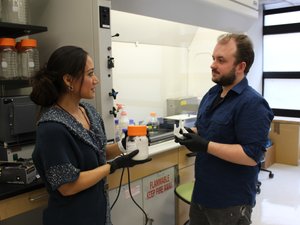
Adeel Malik and Bilal Naved founded Lytic to help patients pinpoint their health condition and get the next steps for obtaining care. In December 2018, the startup got a boost.
Lytic won the Health Tech Venture Challenge hosted by the health tech incubator MATTER and Advocate Aurora Health, taking home $10,000 in funding and kicking off a collaboration with the Advocate Aurora Health system. The startup is also raising an undisclosed amount of pre-seed funding, Malik said.
Using Lytic’s product Checkup, a chatbot-powered digital health management platform, users can look up symptoms, schedule doctor’s appointments, pinpoint which vaccines are necessary for international travel or get health and fitness tips, Malik said. On the provider side, the company is building a tool that collects patient health information and distills it into the SOAP Note format in which doctors typically read patient information, he added.
“This is a great way to know the next best step,” Malik said.
Over the next six to nine months, the funding from the contest as well as its pre-seed funding will help the company collect and analyze data regarding the outcomes of using its technology, and now the startup has begun discussions with Advocate Aurora health executives with the goal of piloting Lytic’s technology in the Advocate Aurora Health system, Malik said.
The startup is looking to scale through its partnership with Advocate Aurora Health as well as talking with other hospitals, health systems and insurance companies, Malik said. Though it’s easier for the startup to scale slowly via health system collaborations, Malik said he envisions taking the startup’s AI technology directly to consumers in the future.
“Within the next year or so, we have a goal to also simultaneously do a consumer driven approach,” Malik said. “When working with an actual business or organization that has members and already has people associated with it, there are much more defined avenues to getting people familiar with and using the tool versus trying to reach a broad general audience as an early stage startup.”
The testing data obtained through Lytic’s partnership with Advocate Aurora Health will enable Lytic to test the consumer outcomes. With the trial data collected, the company’s artificial intelligence technology can examine how users interact with the app and analyze patient outcomes. The latter of the two is a key metric for health systems who want to improve patient care and reduce waste, Malik said.
To safeguard its patient data, Lytic built its technology on the Healthcare Blocks, a HIPPA-compliant cloud-based application platform, Malik said. The data it collects is encrypted, and the startup is not storing people’s names, addresses, or other identifiable information, he said, adding that the company is working to get more security certifications.
Ultimately, the app aims to direct people to the care and health information they need while decreasing healthcare costs.
“Things like AI, machine learning and new digital technologies ... they weren’t being harnessed well enough to combat these specific issues,” Malik said. “That’s how Bilal [Naved] and I got to thinking about what kinds of tools we can create for people to always know what their next steps should be based on the most accurate medical content.”








